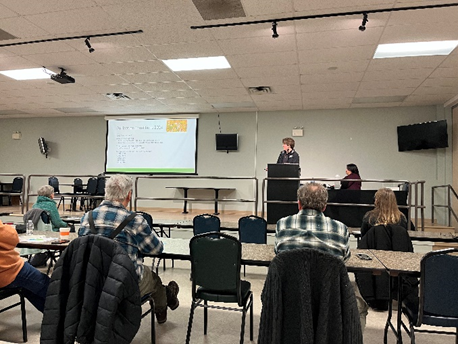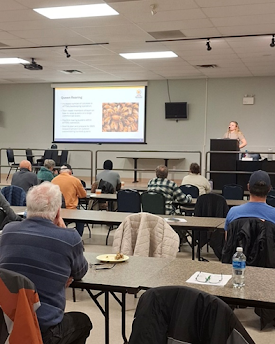This past weekend the Atlantic Tech Transfer Team for Apiculture (ATTTA) had the pleasure of attending the Prince Edward Island Beekeepers’ Association (PEIBA) annual general meeting in Charlottetown, PE. The event was well attended with representation from the beekeeping industry, wild blueberry industry, government, equipment suppliers, and other industry representatives. Read this week’s blog to learn about the highlights of the event.
Review: PEI Beekeepers’ Association Annual General Meeting
The Prince
Edward Island Beekeepers’ Association (PEIBA) annual general meeting 2025
occurred on March 1st in Charlottetown, PE. Troy Fraser, PEIBA
president, welcomed everyone to the meeting and started the PEIBA business
meeting with the president’s report. The association reviewed their 2024
financials and addressed any potential board elections prior to beginning
presentations for the day.
Cameron Menzies, PEI provincial apiarist, gave a provincial update on the island beekeeping industry. Currently, there are an approximate 25 commercial beekeepers on the island who manage 4,500 colonies for pollination services and honey production. This past year the province experienced their highest colony winter loss on record at 61%. The industry reports that weak colonies in the fall is the number one reason for winter loss, followed by poor queens, weather, and Varroa mites. For Varroa mite management, the PEI department of agriculture inspected eight commercial beekeeping operations and sampled mite levels ranging between 0 and 1%, which is below the economic threshold for treatment and suggests that management practices are good. The department also found no American foulbrood during inspections, low incidents of European foulbrood and no small hive beetle. This past season, 9,818 hives provided pollination to wild blueberries on the island, which included local hives and hives imported from Ontario, Manitoba and British Columbia. The average pollination stocking density across the island was 1.6 hives / acre. The average rental price was $226 / hive. There was 2,500 honey producing colonies in 2024, which produced an average of 25lbs. / hive.
Next, Dr. Kaira
Wagoner, Optera CEO and co-inventor of the UBeeOTM Assay, gave a
presentation on the use of UBeeO for selecting hygienic behaviour in honey bee
colonies. Dr. Wagoner discussed the benefits of hygienic behaviour for Varroa
mite management, including reducing the industry’s reliance on chemical
treatment. The Unhealthy Brood Odor (UBeeO) AssayTM works to select
hygienic behaviour by introducing pheromones of unhealthy brood over a section
of healthy brood, and assessing the percentage of brood cells that worker bees
manipulate. A colony is considered to have hygienic behaviour when 60% of cells
are manipulated. The UBeeO AssayTM has less variability of efficacy
compared to other hygienic tests such as the “freeze kill” method. Overall, the
results of UBeeO testing are indicating that colonies that have a higher UBeeO
score have less disease and pest pressure, including lower Varroa mite levels.
To start the
afternoon session, Troy Fraser (PEIBA president) discussed the association’s
goals for hygienic testing and stock going forward. Their first goal is to
promote the use of hygienic testing on PEI. Second, they want to introduce
Varroa sensitive hygiene queens to the province. Third, they want to
incorporate Varroa sensitive hygiene testing and monitoring practices into
island beekeeping operations. Fourth, they want to establish a source of local
Varroa sensitive hygiene queens on the island. Finally, the fifth goal is to
maintain the local hygienic stock using instrumental insemination.
Karen
Thurlow, New Brunswick chief apiary inspector, gave a presentation on her
knowledge of queen breeding, and shared a variety of helpful information for
new and experienced beekeepers. Karen explained how she has made beekeeping
less physically exerting with her unique configuration of both cell starter and
cell finisher colonies when rearing queens, which utilizes multiple nuc boxes
rather than 10-frame deep boxes (which can present a challenge to move without
a second set of hands). Karen also discussed her beekeeping practices
throughout the season including feeding colonies, Varroa mite management, and
equalizing colonies.
The final
presentation of the day was from Kayla Gaudet (Atlantic Tech Transfer Team for
Apiculture) who gave a program update on ATTTA’s extension and research work.
If interested in learning about ATTTA’s research visit: https://www.perennia.ca/portfolio-items/honey-bees/. The ATTTA team will be back on PEI
on April 25th and 26th for an upcoming workshop in
partnership with the PEIBA. More information about the workshop will be shared
in the coming weeks.
Thank you to
all the organizers of this great event, and to all of the presenters for their
knowledge and expertise they bring to the industry.
Connecting with ATTTA Specialists
If you’d like to connect with ATTTA specialists or learn more about our program, you can:
visit our website at https://www.perennia.ca/portfolio-items/honey-bees/
Email attta@perennia.ca




